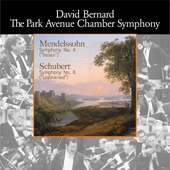|
Back
03/07/2013
Felix Mendelssohn: Symphony No. 4 in A Major, Op. 90, MWV N16, “Italian”
Franz Schubert: Symphony No. 8 in B minor, D. 759, “Unfinished”
The Park Avenue Chamber Symphony, David Bernard (conductor)
Recorded in New York City in October 2012 – 57’52
PACS 0023 (Distributed by Naxos) – Booklet with essays in English

   
The competition between professional music organizations in New York City must equal that of the busiest cosmopolitan areas throughout the world. Yet through simple deduction, the overall quality and availability of musical talent must be significant enough to warrant multiple professional music groups, even those that program the same type of music. Conductor David Bernard surely recognized this when founding The Park Avenue Chamber Symphony. An alumnus of The Juilliard School, Bernard has crafted a group that boasts several notable accomplishments and a substantial discography. 2012 alone saw the release of four CDs including a boisterous Mahler First Symphony. This recording of Mendelssohn and Schubert warhorses is among their most recent, but in a crowded catalogue, is there something here worth hearing?
The short answer is “yes.” From the opening strains of Mendelssohn’s effervescent Fourth Symphony, it is clear that this is no amateur or even mediocre professional group. The violins play with a refined leanness of sound, quick on the strings. The ensemble is tight and uniform. Likewise, the winds play with a keen attention to phrase and cohesion across the sections. Unsurprisingly, more exposed moments in the winds, solos in either oboe or trumpet for example, aren’t quite as consistent in technique as one would hope for, but there is nothing here that is bad.
Conductor David Bernard leads an inspired and consistent reading through the Mendelssohn. Tempi are relatively brisk, but not rushed. Bernard still leaves plenty of room for drama throughout the development of the first movement of the Mendelssohn. The “Andante” breathes wonderfully, but never loses direction. The strings respond with some quite beautiful playing that only becomes more so into the following third movement. The fourth movement is appropriately menacing and weaves mysteriously to its surging conclusion with biting contrasts of dynamics and textures. It is an impressive performance in its excitement and cohesion of ensemble.
The Schubert doesn’t fare quite as well. The tempo of the first movement “Allegro moderato,” is slightly plodding and doesn’t really sing with the desired conviction, often sounding soft around the edges. Throughout both movements, the precision of ensemble isn’t there that was in the Mendelssohn. Still, the sincerity of the playing and nuance of phrasing is present and noticeable.
As a guess, I would say this orchestra sounds better in person. If anything, the recording quality puts the orchestra at a sonic disadvantage. Sound in the midrange and lower register can be slightly congested. There isn’t any recording information in the booklet, but I’m guessing these live recordings (audience applause concludes each piece) might have been done in a spacious church, but the mic placement isn’t too distant as the sound doesn’t have a huge reverb.
While a blind audition to this recording wouldn’t lead the listener to suspect the group as the Berlin Philharmonic, the quality of the playing here is disarming. New Yorkers would do well to check out this emerging ensemble, and existing devotees will no doubt find pleasure in this document of the orchestra’s work.
Matthew Richard Martinez
|